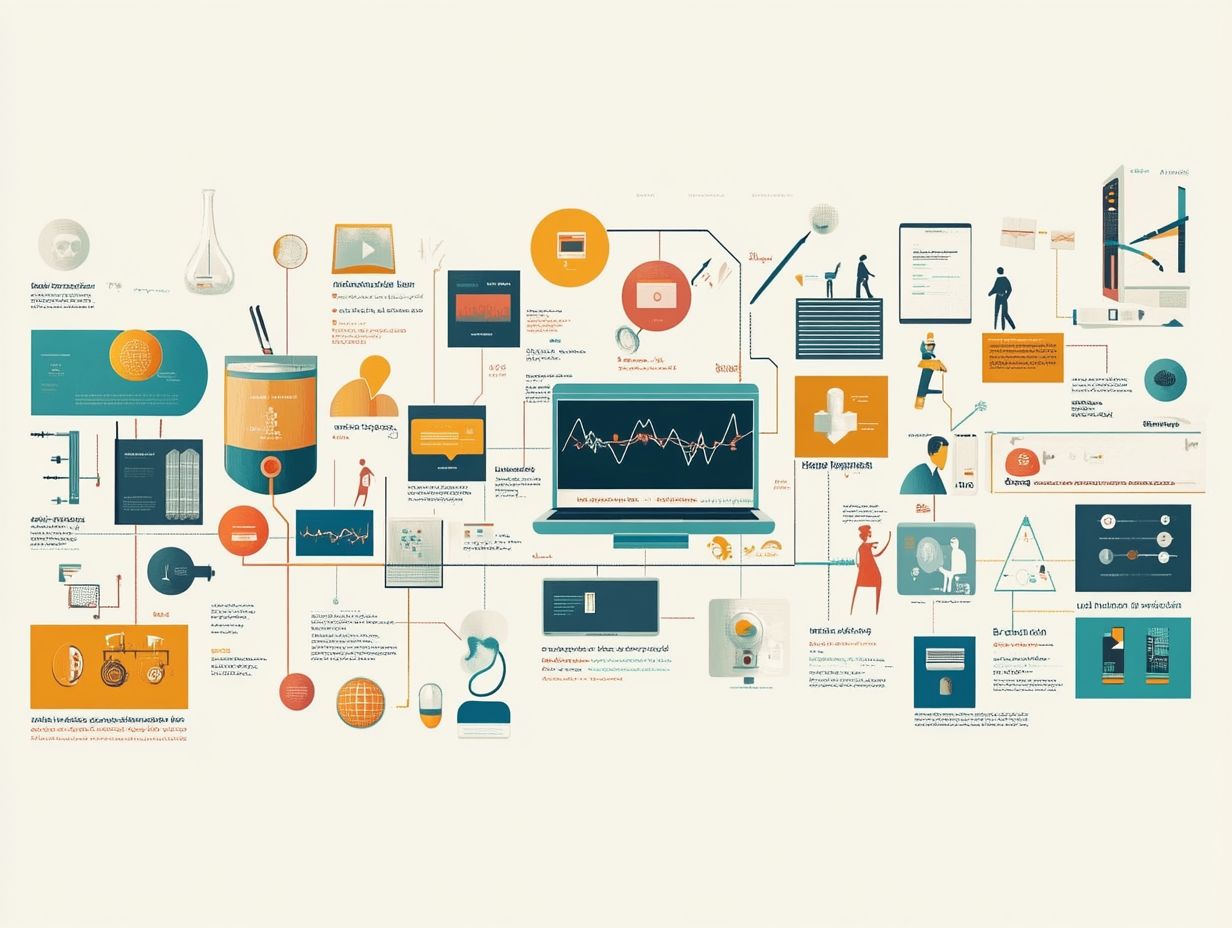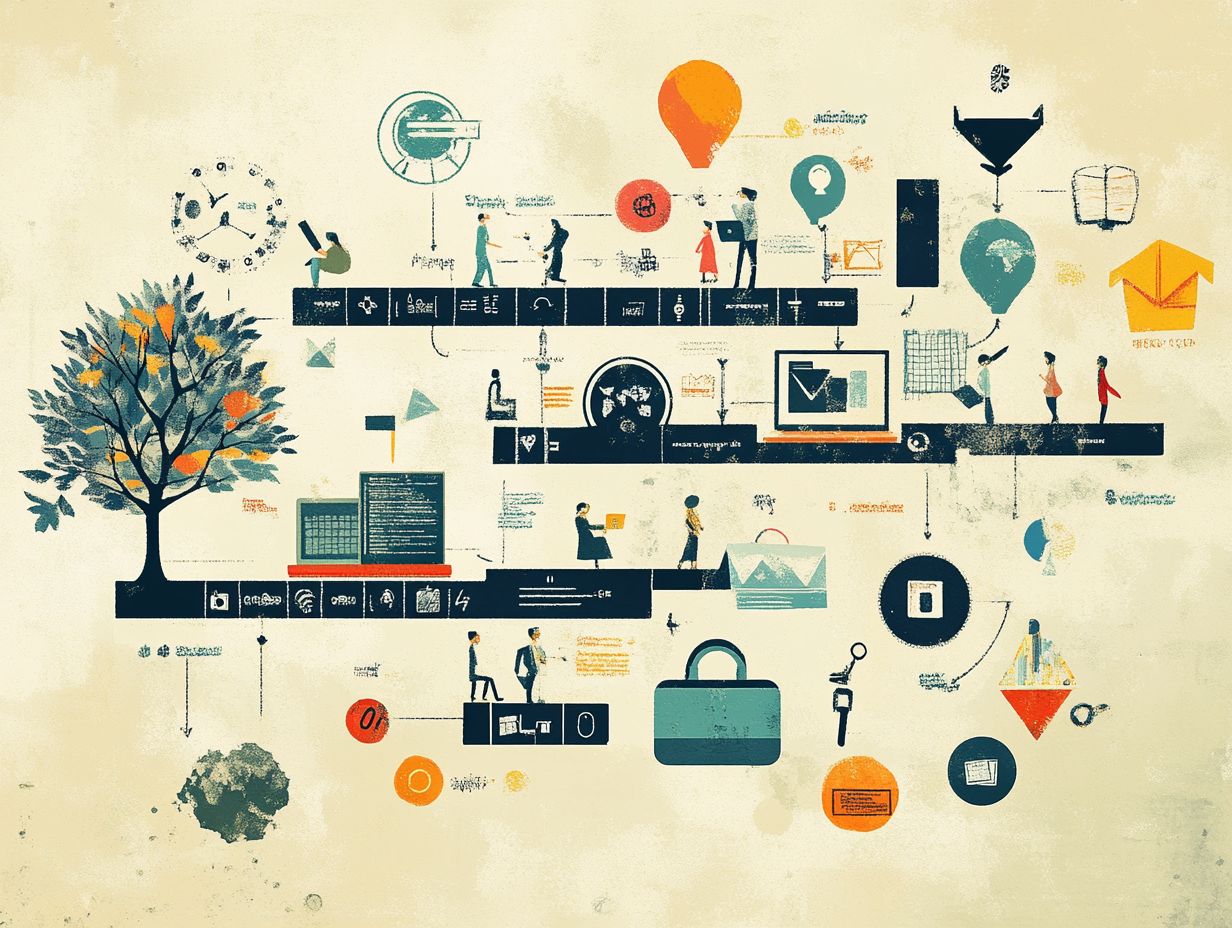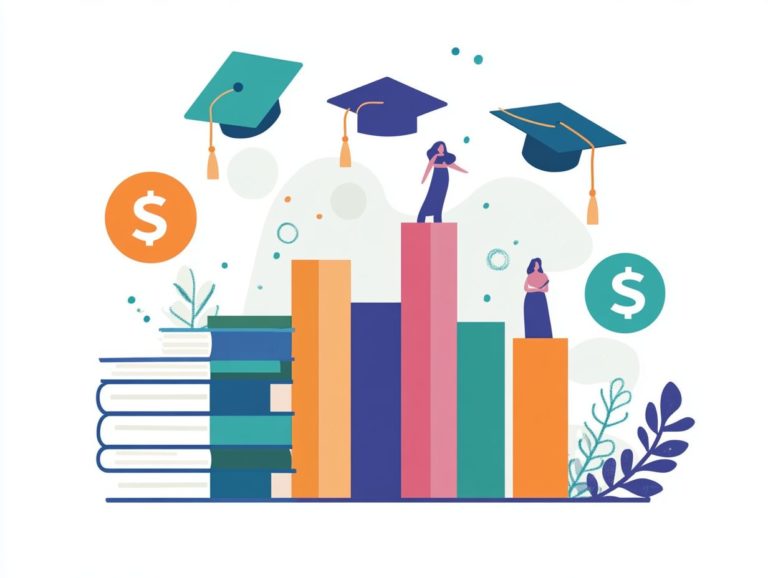The Evolution of Online Bachelor’s Degree Programs
The landscape of higher education has changed dramatically with the emergence of online bachelor’s degree programs.
Once met with skepticism, these programs have matured into flexible, accessible, and cost-effective learning options for a diverse array of students.
As you delve into the history and growth of online education, you’ll discover many exciting benefits, along with the challenges that persist.
Explore the future of these programs and consider their potential impact on traditional education. Don’t miss out on the future of education!
Contents
- Key Takeaways:
- The Rise of Online Bachelor’s Degree Programs
- Advantages of Online Bachelor’s Degree Programs
- Challenges Faced by Online Bachelor’s Degree Programs
- Perceived Lack of Quality
- Accreditation and Credibility Concerns
- The Future of Online Bachelor’s Degree Programs
- Current Trends and Predictions
- Frequently Asked Questions
- What is the evolution of online bachelor’s degree programs?
- When did online bachelor’s degree programs first emerge?
- What factors have contributed to the evolution of online bachelor’s degree programs?
- How have online bachelor’s degree programs evolved in terms of quality?
- What types of online bachelor’s degree programs are now available?
- How do the costs of online bachelor’s degree programs compare to traditional on-campus programs?
- Understanding Online Bachelor’s Degree Programs
Key Takeaways:

Online bachelor s degree programs are increasingly popular. They offer flexibility, save costs, and create more career opportunities.
The Rise of Online Bachelor’s Degree Programs
Pioneers like Champlain College and the University of Phoenix have led the way in online degrees, offering flexible and accessible pathways to learning for both traditional students and adult learners seeking new opportunities.
This transformation is driven by significant improvements in technology and a wealth of educational resources that allow institutions to present a diverse array of online offerings.
History and Growth of Online Education
The evolution of online education has its roots in early correspondence education, which set the stage for the distance learning technologies seen today.
Over the years, advancements in educational technology have transformed the learning landscape, enabling institutions to offer a range of online programs tailored to diverse student needs, particularly highlighted by the recent surge driven by the COVID-19 pandemic.
Gone are the days of simple mailing systems; now, interactive platforms featuring video conferencing and online discussion boards have dramatically improved engagement and accessibility.
With the widespread availability of broadband internet, institutions have broadened their offerings, seamlessly integrating multimedia resources that enrich your educational experience.
The emergence of learning management systems has also streamlined the process for educators, making it easier to deliver courses and monitor your progress.
As more people become aware of the flexibility and affordability that online education provides, an increasing number of individuals are choosing to enroll.
Advantages of Online Bachelor’s Degree Programs
Online bachelor’s degree programs present a wealth of advantages tailored to your unique needs as a modern learner, offering a level of flexibility that traditional education methods simply can’t match.
You have the freedom to select from an extensive array of online classes that seamlessly fit into your busy schedule, enabling you to juggle work, family, and studies without missing a beat.
This approach not only eliminates commuting expenses but also delivers substantial savings on tuition and educational materials, ultimately making higher education more accessible for adult learners and those seeking to pivot into new career paths.
Explore your options today!
Flexibility and Accessibility
One of the standout advantages of online bachelor’s degree programs is their impressive flexibility. They allow you to customize your educational journey around your unique schedule and commitments.
You can choose between asynchronous learning, where you tackle coursework at your own pace, and synchronous options with real-time instruction, all enhanced by advanced online tools.
This adaptability elevates your engagement, as you can participate in discussions and complete assignments when they best fit your personal and professional life.
The diverse course offerings from business management to computer science cater to a wide array of interests. This ensures you find a program that aligns perfectly with your aspirations.
With a wealth of resources just a click away, you can research, collaborate, and receive feedback in an interactive environment. This ultimately leads to improved learning outcomes and heightened motivation.
The convenience of accessing materials online enables you to take a more proactive approach to your education. This fosters a true sense of ownership over your academic success.
Cost Savings
Cost savings are a compelling advantage of online bachelor’s degree programs, making higher education more accessible to a wider audience. By enrolling in online classes, you can often save on tuition fees, transportation costs, and housing expenses.
Many online institutions offer lower tuition rates than traditional colleges, significantly reducing the overall cost of your degree. The flexibility of studying from home means you can forgo the daily commute, saving both time and money.
Financial aid options for online learners include scholarships, grants, and low-interest loans that enhance affordability even further. These resources can considerably lighten the financial load, enabling you to pursue your desired field without the burden of crippling debt.
As a result, more students are beginning to see the value in an online education. It not only accommodates their scheduling needs but also aligns with their budgetary considerations.
Increased Career Opportunities

The rise of online bachelor’s degree programs has significantly expanded your career opportunities. Employers are excited about the value of these qualifications in today s job market.
This evolution is particularly advantageous for adult learners like you, who may be seeking to enhance credentials or pivot in their careers without sacrificing current professional commitments.
Data reveals that individuals with online degrees frequently enjoy higher job placement rates and enhanced salaries compared to their peers lacking such qualifications. A recent study by the Online Learning Consortium found that 80% of graduates with online degrees felt a boost in their confidence regarding employability prospects.
Case studies from various universities indicate that alumni who pursued their degrees online were promoted 20% faster than those who did not continue their education. This burgeoning trend underscores how a flexible learning environment can lead to tangible career advancements, positioning you favorably in an increasingly competitive job landscape.
Challenges Faced by Online Bachelor’s Degree Programs
While online bachelor’s degree programs offer numerous advantages, they also encounter several challenges that can quickly impact how students view these programs.
Key issues include concerns about quality and questions surrounding accreditation and credibility. These factors can diminish student engagement and dissuade potential learners from enrolling in these innovative programs.
Perceived Lack of Quality
One common concern with online bachelor’s degree programs is the perception that online degrees lack the quality associated with traditional education methods. This belief can affect your results and enrollment rates.
Critics often argue that online education is less rigorous and engaging than conventional classrooms, raising doubts about the effectiveness of educational technology in providing comprehensive learning experiences.
This perception often overlooks the remarkable advancements in interactive technologies and innovative teaching methods designed to enhance student engagement in virtual settings. Personalized learning paths, consistent feedback, and diverse multimedia resources can create a vibrant educational environment.
The misconception that online education revolves entirely around self-paced learning diminishes the value of structured community interactions that many programs actively promote.
By prioritizing collaboration through discussion forums and group projects, online education can deliver impressive results that rival traditional formats. This shift helps reshape the narrative surrounding its effectiveness, showcasing the true potential of online learning.
Accreditation and Credibility Concerns
Accreditation and credibility concerns present a significant barrier for online bachelor’s degree programs. You may hesitate to enroll in programs lacking recognition from established accreditation bodies. The trustworthiness of online education largely depends on the reputation of the institutions offering these programs. Accredited universities are often viewed as more reliable and credible.
This perception shapes your educational choices and impacts your future career prospects. When institutions maintain accreditation from reputable organizations, they send a clear message to both students and employers: they uphold high educational standards. This reassurance can reduce doubts about the quality of the education you receive and enhance your degree’s value in the job market.
Accredited programs typically offer a more enriching learning experience, complete with superior resources, seasoned faculty, and comprehensive support services. This combination strengthens their appeal for prospective students like you.
The Future of Online Bachelor’s Degree Programs
The future of online bachelor’s degree programs looks exceptionally promising. Current trends indicate robust growth, fueled by advancing technologies and rising public awareness of online education’s value, particularly as highlighted in the evolution of online master’s degree accreditation.
Get ready for exciting new hybrid learning models that are on the rise, showcasing a growing acceptance of diverse educational pathways.
Current Trends and Predictions
Current trends in online education reveal a growing focus on digital technology, enhanced student engagement, and a diverse array of course offerings tailored to today’s learners.
You ll find platforms integrating artificial intelligence to create adaptive learning environments that respond to your progress and preferences. This shift toward personalized education is set to deepen your engagement and improve retention rates, as you’ll have access to resources that align with your learning style.
Innovative teaching methods, such as gamification and experiential learning, are transforming course designs, making participation more appealing.
As these trends continue to unfold, expect future online offerings to include a broader selection of courses emphasizing practical skills and real-world applications, cultivating a more dynamic and responsive educational landscape.
Potential Impact on Traditional Education

The impact of online education on traditional educational models is substantial. The emergence of online bachelor s degree programs signifies a big change in the educational landscape.
As hybrid learning approaches (a mix of online and in-person classes) gain traction, traditional institutions must adapt their offerings to stay competitive. They need to meet the evolving needs of students like you.
As you and many others seek flexibility and personalized educational experiences, institutions are beginning to recognize the need to innovate. By integrating online components into existing programs, colleges and universities can reach a diverse student population that values accessibility.
This transformation enhances your learning experience and can boost enrollment rates. Schools are encouraged to rethink their engagement strategies, promoting a blended model that combines the best of both in-person and digital environments.
This helps schools better prepare you and others for future success!
Frequently Asked Questions
What is the evolution of online bachelor’s degree programs?
The evolution of online bachelor’s degree programs refers to the development and changes in delivery, accessibility, and quality over time, particularly highlighting the impact of online education on traditional bachelor’s degrees.
When did online bachelor’s degree programs first emerge?
Online bachelor’s degree programs first emerged in the 1990s, with the University of Phoenix offering the first fully online degree program in 1989. However, it wasn’t until the early 2000s that understanding the curriculum of online bachelor’s programs became more widely available and accepted.
What factors have contributed to the evolution of online bachelor’s degree programs?
Advancements in technology, increased demand for flexible education options, and the rise of online education platforms have all contributed to the evolution of online bachelor’s degree programs. Additionally, the future of online bachelor’s degrees has been accelerated by the COVID-19 pandemic, further boosting the growth of online education.
How have online bachelor’s degree programs evolved in terms of quality?
Initially, online bachelor’s degree programs were seen as inferior to traditional on-campus programs in terms of quality. However, with advancements in technology and improvements in instructional design, online programs have become more interactive, engaging, and rigorous. This evolution has paved the way for discussions about the future of online associate degree programs, leading to their recognition as comparable to on-campus programs in terms of quality.
What types of online bachelor’s degree programs are now available?
There are now a variety of online bachelor’s degree programs available, including fully online programs, hybrid programs that combine online and on-campus learning, and competency-based programs that allow students to progress at their own pace. For those interested in understanding what to expect, many traditional universities now offer online versions of their on-campus degree programs, and you can find detailed insights in this guide on what to expect in an online bachelor’s degree program.
How do the costs of online bachelor’s degree programs compare to traditional on-campus programs?
The costs of online bachelor’s degree programs can vary. Generally, they tend to be more affordable than traditional on-campus programs, as they often do not include room and board expenses. However, tuition rates can differ significantly among institutions.
Understanding Online Bachelor’s Degree Programs
The costs of online bachelor’s degree programs can vary between institutions. However, they are generally more affordable because universities have lower operating expenses.
Online programs also provide greater financial aid and scholarship opportunities for students.
What factors have contributed to the evolution of online bachelor’s degree programs? Advancements in technology and a growing demand for flexible education have shaped this landscape. Additionally, the evolution of online doctoral degrees has influenced the overall growth of online education, which was further accelerated by the COVID-19 pandemic.
How have online bachelor’s degree programs improved in quality? Initially viewed as inferior to traditional programs, online courses have evolved significantly. They now feature interactive and rigorous formats, highlighting the role of faculty in online bachelor’s degree programs, making them comparable to on-campus education.
What types of online bachelor’s degree programs are available today? Students can choose from fully online programs, hybrid formats that blend online and on-campus learning, and programs that allow self-paced learning. Understanding the impact of online bachelor’s degrees on lifelong learning is crucial, as many universities now offer online versions of their traditional degrees.
Are you ready to explore your options? Online bachelor’s degrees may just be the perfect fit for your educational journey!







